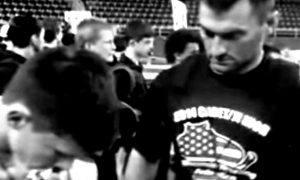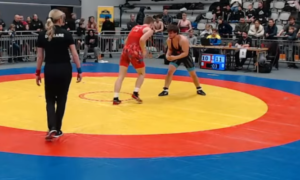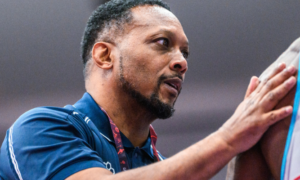Over the weekend in Serbia (yes, Serbia — again) two United States Greco-Roman athletes, Barrett Stanghill (Minnesota Storm) and Hayden Zillmer (Minnesota Storm) competed at the 31st annual Ljubomir Ivanovic-Gedza International. Zillmer, 24, continued to tack onto his already impressive 2017 campaign by grabbing a bronze after going 3-1, with two of those wins coming via fall. Similar to Daniel Miller‘s (Marines) clutch comeback in Hungary, Zillmer was also forced to make something happen late. Down by a pair of points to Stjepan Lavoric (CRO) with under a minute remaining, Zillmer ducked under for a bodylock and twisted Lavoric straight to his back for the fall.
Zillmer was in the hunt from the start on Sunday. He opened up with a pin over Janko Ivetic (SRB) and then proceeded to completely dominate 2017 Junior Asian Championships runner-up Amirmohammed Noroozipasand (IRI). In that bout, Zillmer scored two takedowns in the second period to make it 6-0 and very nearly exposed Noroozipasand off the edge to come away with the tech. A tough 2-0 semifinal loss to eventual champ and this year’s Grand Prix Zagreb Open winner Mikheil Kajaia (SRB) followed, sending Zillmer to the bronze round where he prevailed over Lavoric. It is Zillmer’s third international medal of 2017 and his second on foreign soil. Prior to yesterday’s bronze, Zillmer took second at both Finland’s Herman Kare International in January and the Dave Schultz Memorial a month later.
Stanghill went Saturday and began the weekend hunting for his first steps on an international podium. The NMU grad went 0-2, but it was a hard 0-2. Stanghill’s first loss was to 2016 U23 European Championships gold medalist Erik Svilvassy (HUN) 3-0. Svilvassy nailed a two-point arm throw seconds in and added a passivity point in the final frame. The Hungarian pulled Stanghill into the repechage, a shot at a medal still in reach. Against Nikolaj Dobrev (SRB), Stanghill hustled right from the whistle and earned himself a passive point. Of course, given the general nature of events like this, Dobrev collected his own point later on in the first to take a criteria lead, which is how this one would end. Is it a heartbreaking loss for Stanghill? Probably not. He went over to Europe to train and get some competition for the sake of overall improvement. He’ll get his medal(s) eventually. But a 1-1 criteria loss is certainly frustrating, particularly when the effort was there throughout the entire second period.
Busy period at the OTC
Last week at the US Olympic Training Center in Colorado Springs, the Cadets and Juniors had their combined training camp. That would be news on its own if it weren’t for this one other fact — a lot of the athletes who attended liked what was going on so much over there that they chose to hang around this week, too. These training camps are often a very big deal for age groupers. Even for those who have had the opportunity to work out at the OTC previously, getting together in a structured environment with a collection of other athletes in their age ranges tends to turn a light bulb on. It is a unifying factor. Throw in the high-level coaching and increased attention, and it’s no wonder why the experience makes such a big impression. US National Team head coach Matt Lindland is understandably pleased with the amount of motivation the youths are showing.
“It was an amazing week and many stayed into this week,” said Lindland. “Greco has our own thing going on. Freestyle has their National Team camp and there is a developmental camp in progress, as well.”
In addition to the Cadets and Juniors, the Seniors who are residents at the OTC have been picking up the pace once again and getting on the mat more. Towards the latter part of the month, the Senior Greco-Roman National Team camp will kick off and overlap into early August.
Welcome to the hardcore, Benji and Gabe
Last week, Greco in the US got a nice shot in the arm when two athletes, one perhaps a little more well-known than the other, committed to the sport full-time. Wisconsin high school star Benji Peak confirmed that he would be forgoing his senior year at Elkhorn so that he could go ahead and get a jump on things at Northern Michigan. Peak is a great catch for the US program. He was a runner-up at Fargo in 2015 before taking third last year, but forget about that for a moment. What sets Peak apart is that he has been overseas and competed very well there. He’s not a babe in the woods necessarily, at least not in the way many are when they encounter foreign competition for the first time. Above all, Peak is an aggressive performer. The kid just loves to score and expects himself to. Plus, he’ll have good buddy Alston Nutter (66 kg) to lean on once he gets settled in Marquette, a prospect he does not take lightly.
“Now that he’s (Nutter) been there, he told me it’s the best thing he could have done for his Greco-Roman wrestling and his career in the future,” Peak said last week. “I hope it’s like that for me, too. He said it’s fun, but that you mature faster because you’re on your own, obviously. He makes it sound pretty good, so I’m hoping it’s as good for me as it is for him.”
And then it was Cornell star and two-time NCAA Division I National Champion Gabe Dean confirming that, yes, he’ll be coming over to Greco. In a way, you can’t really say that he is “crossing over” (as we did), simply because Dean is actually not completely new to the style and also, he wasn’t exactly locked into freestyle. In 2015, Dean went Greco for the US at the Pan Am Championships in Santiago, Chile and came away with a silver medal, a mightily impressive feat considering he only had two weeks to practice for the event. It also doesn’t hurt that his father, Dave, was a national-caliber competitor in the 90’s (and funnily enough, also has a Pan Ams silver to his name).
Dean is a superbly talented all-around athlete and if all you saw was his performance at the Pan Ams two years ago, and had no idea about his collegiate career, you’d recognize right away that he is a legitimate prospect. He showed off a nice gutwrench, unveiled decent defense from bottom, and displayed vicious snaps and some savvy hand-fighting skills that will only be improved. The only two questions hovering in the air about Dean going Greco are: 1) Will other blue chip collegians be following his lead eventually? 2) How will he fit in at 85 kilos, one of the most stacked weights in the country? We will be examining the latter coming up this week.
Georgia reigns supreme at the Junior European Championships again
The team standings will show that Georgia only defeated Russia by three measly points in Dortmund (after edging it out by only two last year), but back-to-back-to-back team titles at any event deserves to be recognized. In 2016, Georgia had three golds, one silver, and two bronze. This year, they upped the ante a little bit (and had to) with three golds, one silver, and four bronze medals. That’s what they needed to stop a well-stocked Russian squad that ended the two-day tournament with two golds, two silvers, and two bronze.
Zviadi Pataridze (120 kg, world no. 14 at Senior 130) led Georgia once again, picking up his third straight Junior Euros gold. It has been an astounding age-group career for Pataridze. He’s already a two-time Cadet and Junior World Champion to go along with his success at the European Championships, and he has also performed very well thus far as a Senior when he’s gotten the chance. He’ll be looking for his third Junior World gold in Finland come August. Pataridze was hardly challenged this weekend. Lenerd Berai (ROU) hung in there as best he could in the semis and managed to make it the distance in what was a 7-1 Pataridze win. Other than that, the Georgian was utterly dominant in rolling up three techs, including one in the finals over Russian Georgi Gadzhinov. Pataridze is also the only wrestler to record a tech in the finals.
Other champs for Georgia were Ramaz Silagava (50 kg, and who broke out a slick arm throw in the finals) and 2016 Cadet World champ Leri Abuladze (60 kg).
Parviz Nasibov (UKR) improved on his 2016 runner-up performance with a gold at 66 kilos. Once Nasibov becomes more a little more seasoned, he’s going to be a major force. The two-time Cadet World medalist looks ridiculously strong in the pummel and doesn’t put himself in danger too often. He had a few tense battles in Germany and needed a couple of calls to go his way. But he knows when to turn it on, especially come crunch time. Nasibov didn’t do so well last year at the Junior Worlds, so a big jump up should be expected in Finland.
In other news, Arvi Savolainen (96 kg) delivered the first Euro Junior gold for Finland since 2009 with a 3-0 victory over Suleyman Erbay (TUR).
2017 Junior European Championships Final Results
50 kg: Ramaz Silagava (GEO) def. Zulfigar Aliyev (AZE) 5-1
55 kg: Kerem Kamal (TUR) def. Emin Sefershaev (RUS) 5-3
60 kg: Leri Abuladze (GEO) def. Ardit Fazljia (SWE) 6-4
66 kg: Parviz Nasibov (UKR) def. Giorgi Kurtanidze (GEO) 4-0
74 kg: Narek Oganian (RUS) def. Elmar Nuraliev (UKR) 2-1
84 kg: Aleksander Komarov (RUS) def. Mikita Klimovich (BLR) 2-1
96 kg: Arvi Savolainen (FIN) def. Suleyman Erbay (TUR) 3-0
120 kg: Zviadi Pataridze (GEO) def. Georgi Gadzhinov (RUS) 8-0, TF
Questions? Concerns? Feel like reaching out? Do so on Twitter, Facebook, and Instagram!
SUBSCRIBE TO THE FIVE POINT MOVE PODCAST
iTunes | Stitcher | Spreaker | Google Play Music | RSS
















